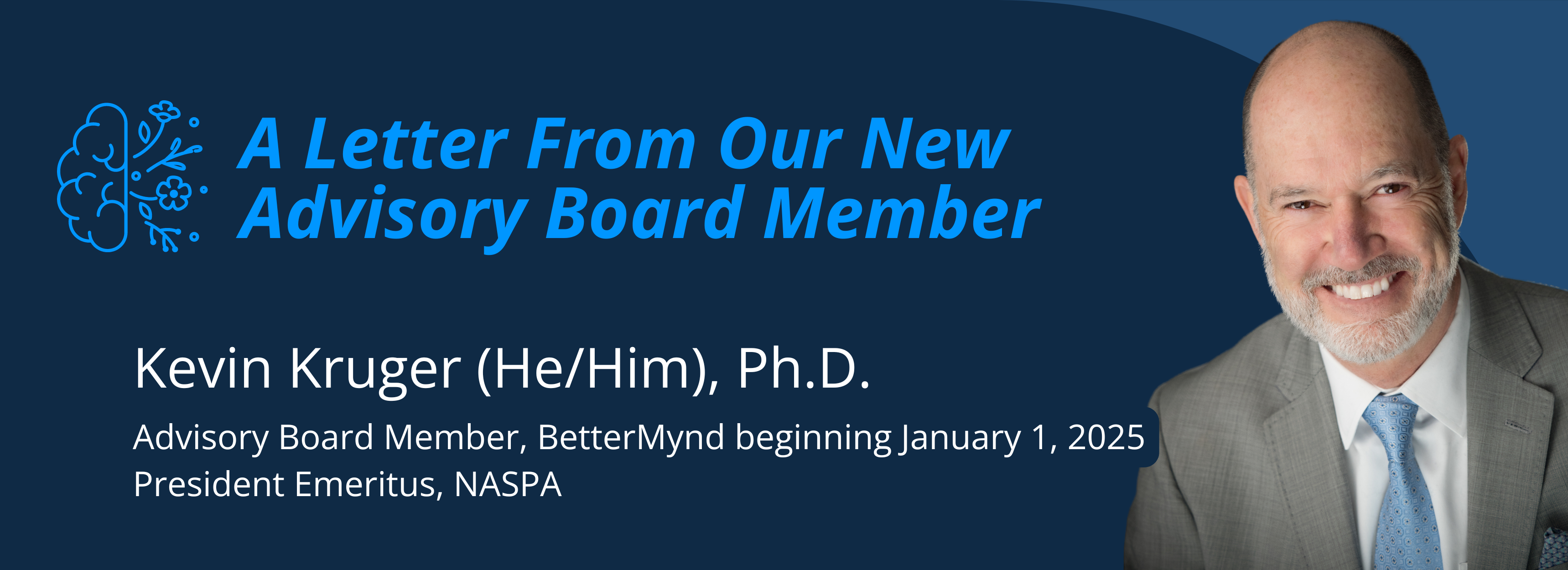As many of you know, I’ve spent over 45 years in higher education, the last 12 of which I had the honor of serving as President and CEO of NASPA – Student Affairs Administrators in Higher Education. My journey in higher education started long before that, in roles at institutions like Southern Methodist University and the University of Maryland. Over the years, I’ve witnessed how higher education has evolved—especially in the realm of student support. And now, as I transition into my new role as President Emeritus, I’m thrilled to announce that I’ll be continuing my work on behalf of students in a new capacity.
Starting January 1, 2025, I’ll be joining the advisory board of BetterMynd, a startup that is reshaping the way colleges and universities provide equitable – not equal – mental health support. As someone who has dedicated his career to improving student success and well-being, this opportunity feels like the perfect next chapter.
In my time at NASPA, I’ve had the privilege of representing the student affairs community across national forums and contributing to key conversations about student mental health. We’ve seen, especially in recent years, how mental health challenges have grown into one of the most pressing issues on our campuses. Reports, like those from the Center for Collegiate Mental Health (CCMH) at Penn State, have made it clear that the traditional models of mental health support—often based on equality rather than equity—are no longer sufficient. Students today need personalized, flexible care that addresses their unique challenges.
Student affairs leaders must also navigate the challenging – and for some, existential – fiscal environment in which colleges and universities find themselves today. This requires careful management of resources, especially in critical areas such as mental health services. In an era where every dollar counts, it is essential for college administrators to ensure that mental health programs are both effective and fiscally responsible.
I believe financial waste in college mental health programs often arises from misaligned services that fail to address students’ actual needs. Common issues include underutilized services, excessive spending on solutions with minimal benefit, and redundant programs.
That’s where BetterMynd comes in. I’ve watched the team develop into a robust operation that serves over 150 campuses, approaching mental health services through an equity lens that prioritizes mission impact over profit. Unlike many providers, BetterMynd understands that supporting student mental health is not “one size fits all” and their service model allows students to access support that is tailored to their individual needs (e.g. anxiety, academic pressure, relationship challenges, trauma, racism etc.) – without financial waste.
Throughout my career, I’ve seen firsthand the impact that access to mental health support can have on a student’s ability to succeed—not just in college, but in life. In my work at NASPA, I frequently spoke about the importance of student well-being and the critical need for support systems that extend beyond the classroom. I’ve always believed that student affairs professionals play a key role in helping students thrive, and that belief drives me in this new role.
Joining the BetterMynd advisory board allows me to continue advocating for the 22 million college students across the country who deserve access to mental health resources that truly meet their individual needs. BetterMynd’s model of care—one that is equitable, flexible, and cost-effective—represents a significant step forward in addressing the mental health crisis we face on our campuses.
It’s been a privilege to dedicate my career to improving student well-being, and I’m honored to continue that work in this new capacity with BetterMynd. Together, we can ensure that mental health resources are not just available but truly accessible and personalized for every student who needs them.
In health,
Kevin Kruger




